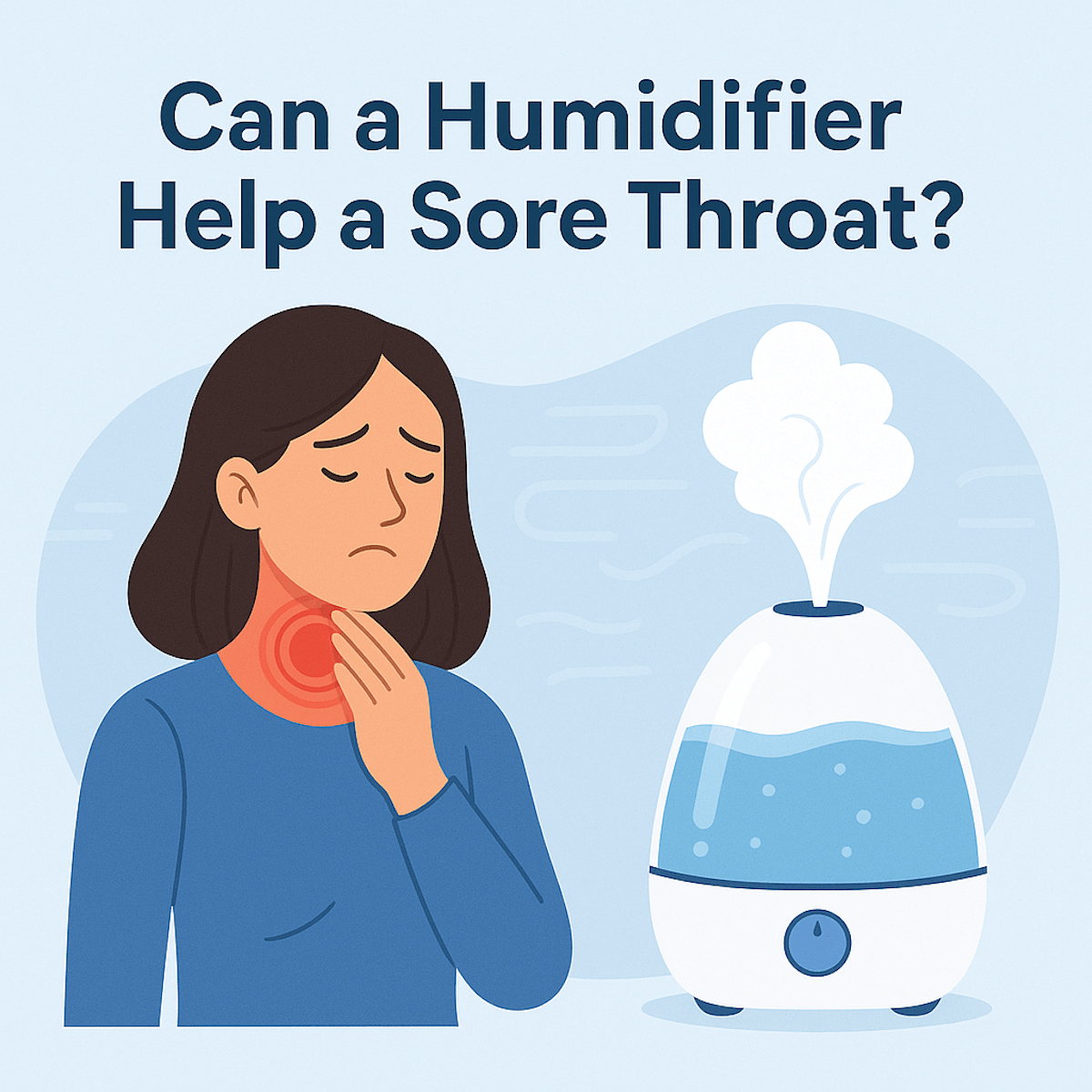Waking up with a dry, scratchy throat can be uncomfortable and frustrating, especially during cold weather or allergy season. While there are many remedies available, one common household device often comes up as a potential solution: the humidifier.
But can a humidifier really help relieve a sore throat?
In this article, we’ll explore how dry air affects throat health, how humidifiers work, and whether adding moisture to your environment can truly ease throat irritation and promote faster healing.
Download our free guide that has over 100+ of the best tips for healthy lungs.
Can a Humidifier Help a Sore Throat?
Yes, a humidifier can help soothe a sore throat, especially if the discomfort is caused by dry air. When indoor air lacks moisture, it can dry out the mucous membranes in your throat, leading to irritation and soreness.
A humidifier adds moisture to the air, which helps keep your throat hydrated, reduces inflammation, and eases pain. This is particularly helpful during the winter months or in air-conditioned environments. For best results, use a cool-mist humidifier, keep humidity levels between 30–50%, and clean the device regularly to prevent the growth of mold and bacteria.

Understanding Sore Throats and Their Causes
A sore throat, medically known as pharyngitis, occurs when the tissues in the throat become inflamed and irritated. This inflammation can result from numerous factors, including viral infections like the common cold or flu, bacterial infections such as strep throat, allergic reactions to pollen or dust, acid reflux, smoking, or exposure to dry air and environmental pollutants.
The throat contains delicate mucous membranes that serve as the first line of defense against pathogens and irritants entering the respiratory system. When these membranes become dry or irritated, they lose their effectiveness and become more susceptible to inflammation and infection. This is where environmental moisture levels play a crucial role in maintaining throat health.
The Role of Humidity in Respiratory Health
Humidity refers to the amount of water vapor present in the air. Indoor humidity levels typically range from 30% to 50%, with the ideal range being between 40% and 50% for optimal comfort and health.
During winter months or in dry climates, indoor humidity can drop significantly, sometimes falling below 20%. This dramatic decrease in moisture can have profound effects on respiratory health and throat comfort.
When humidity levels are too low, the mucous membranes in the nose, throat, and respiratory tract begin to dry out. These membranes rely on adequate moisture to function properly, trapping dust, allergens, and pathogens before they can penetrate deeper into the respiratory system. Dry membranes become irritated, inflamed, and less effective at their protective functions, creating an environment where sore throats are more likely to develop or worsen.
Key Point: Optimal indoor humidity levels between 40-50% help maintain healthy mucous membranes and may reduce the likelihood of throat irritation.
How Humidifiers Work to Relieve Sore Throats
Humidifiers work by adding moisture to the air through various mechanisms, depending on the type of device. Cool mist humidifiers use ultrasonic technology or evaporation to disperse water particles into the air, while warm mist humidifiers heat water to create steam.
Both methods increase the overall humidity in a room, which can provide several benefits for sore throat sufferers.
Moisturizing Mucous Membranes
The primary benefit of increased humidity for sore throats lies in its ability to keep mucous membranes moist and functional. When the air contains adequate moisture, the throat’s natural protective barriers remain hydrated and can more effectively trap irritants and pathogens. This moisturizing effect can reduce the scratchy, dry sensation often associated with sore throats and may help prevent further irritation.
Reducing Inflammation
Dry air can exacerbate inflammation in already irritated throat tissues. By maintaining proper humidity levels, humidifiers may help reduce this inflammatory response, allowing the throat to heal more effectively. The gentle moisture can soothe inflamed tissues and provide a more comfortable environment for recovery.
Thinning Mucus Secretions
Adequate humidity helps thin mucus secretions, making them easier to clear from the throat and respiratory tract. Thick, sticky mucus can contribute to throat irritation and discomfort, while properly thinned secretions flow more freely and cause less irritation as they move through the throat.
Scientific Evidence and Medical Perspectives
While anecdotal evidence strongly supports the use of humidifiers for relieving sore throats, scientific research on this specific application is somewhat limited. However, studies have consistently shown that maintaining proper humidity levels supports overall respiratory health and can reduce the incidence of respiratory infections and associated symptoms.
Research published in respiratory medicine journals has demonstrated that low-humidity environments can increase susceptibility to viral infections and worsen symptoms of existing respiratory conditions. Healthcare professionals often recommend maintaining adequate humidity levels as part of comprehensive treatment plans for various throat and respiratory ailments.
Pediatricians frequently recommend humidifiers for children with croup, a condition that causes throat inflammation and breathing difficulties. The moisture helps reduce airway inflammation and makes breathing more comfortable, suggesting similar benefits may apply to other forms of throat irritation.
Types of Humidifiers and Their Effectiveness
Cool Mist Humidifiers
Cool mist humidifiers are generally considered safer than warm mist versions, particularly in households with children or pets. They don’t pose burn risks and consume less energy. Ultrasonic cool mist humidifiers are particularly quiet and efficient, making them ideal for bedroom use during illness recovery.
Warm Mist Humidifiers
Warm mist humidifiers heat water to create steam, which can feel particularly soothing for sore throats. The warm moisture may provide additional comfort compared to cool mist, and the heating process kills bacteria and mold that might be present in the water. However, they pose burn risks and consume more energy.
Evaporative Humidifiers
These devices use a fan to blow air through a wet wick or filter, naturally evaporating water into the air. They’re self-regulating, meaning they automatically adjust output based on current humidity levels. This makes them less likely to over-humidify a space.
Important: Regardless of type, all humidifiers require regular cleaning and maintenance to prevent mold and bacteria growth, which could worsen respiratory symptoms.
Best Humidifier for a Sore Throat
The Everlasting Comfort Ultrasonic Cool Mist Humidifier stands out as a top choice for soothing a sore throat thanks to its unique and user-friendly features.
Enjoy personalized, quiet comfort with this smart humidifier that adapts to your home’s needs, ensuring optimal moisture levels and relief from dry air.
First, as an ultrasonic humidifier, it operates quietly and efficiently, providing a comfortable, noise-free environment, especially valuable for those seeking relief during sleep hours. The cool mist technology helps moisturize the air efficiently without significantly altering the room temperature, thereby reducing the irritation caused by dry air and soothing a sore throat.
Additionally, this humidifier features a substantial 6-liter tank, capable of humidifying rooms up to 500 square feet and operating continuously for up to 50 hours. This long run-time ensures that the air remains consistently humidified, providing ongoing relief for a sore throat.
It also comes with an essential oil tray, a rare feature in most humidifiers. This means you can add your favorite essential oils into the mix, further enhancing the soothing environment. Lastly, it’s equipped with an auto shut-off feature that turns the device off when it runs out of water, ensuring safety and peace of mind for the users.
Proper Use and Safety Considerations
To maximize the benefits of humidifiers for sore throat relief while minimizing risks, proper use and maintenance are essential. Humidifiers should be cleaned regularly according to manufacturer instructions, typically every few days during active use. Distilled or demineralized water should be used when possible to prevent mineral buildup and reduce the dispersal of impurities into the air.
Monitoring humidity levels with a hygrometer helps ensure optimal conditions without over-humidification, which can promote mold and dust mite growth. Humidity levels above 60% can create problems, so maintaining levels between 40-50% is ideal for most people.
Placement of the humidifier is also important. The device should be positioned away from walls and furniture to allow proper air circulation, and in bedrooms, it should be placed at a safe distance from the bed to prevent excessive moisture exposure during sleep.
Additional Benefits Beyond Sore Throat Relief
While sore throat relief is a primary concern, humidifiers offer numerous additional health benefits. Proper humidity levels can reduce the incidence of nosebleeds, alleviate dry skin conditions, and improve overall sleep quality. Some people find that adequate humidity helps reduce snoring and makes breathing more comfortable throughout the night.
For individuals with chronic respiratory conditions like asthma or allergies, maintaining proper humidity levels may help reduce symptom frequency and severity. However, it’s important to note that those with dust mite allergies should be particularly careful not to over-humidify, as dust mites thrive in high-humidity environments.
When to Seek Medical Attention
While humidifiers can provide significant relief for many types of sore throats, certain symptoms warrant medical evaluation. Severe throat pain, difficulty swallowing, fever above 101°F (38.3°C), swollen lymph nodes, or symptoms lasting more than a few days should prompt a visit to a healthcare provider.
Bacterial infections like strep throat require antibiotic treatment and won’t resolve with humidity alone. Similarly, sore throats caused by acid reflux or other underlying conditions need targeted medical treatment in addition to supportive care like humidification.
FAQs About Humidifiers and Sore Throats
Can a Humidifier Make You Sick?
Yes, a humidifier can make you sick if it’s not properly cleaned and maintained. When the device harbors mold, bacteria, or other harmful microorganisms, it can disperse these into the air, leading to respiratory issues, allergies, or even infections.
Using distilled water, changing filters regularly, and cleaning the humidifier according to the manufacturer’s instructions can help prevent these problems and ensure it supports your health rather than harming it.
Does Humidity Affect a Sore Throat?
Yes, humidity can significantly affect a sore throat. Dry air can irritate the mucous membranes in your throat, making symptoms worse and prolonging recovery. By increasing humidity levels, moisture helps keep the throat tissues hydrated, reduces inflammation, and eases discomfort.
However, excessive humidity can encourage mold growth, which may irritate your throat further. Maintaining an optimal indoor humidity level—typically between 30% and 50%—is ideal for soothing sore throats without causing additional issues.
How Does a Humidifier Help a Sore Throat?
A humidifier helps a sore throat by adding moisture to the air, which prevents the throat from becoming too dry and irritated. When the air is properly humidified, it soothes inflamed tissues, eases discomfort, and may even help loosen mucus that contributes to coughing and throat irritation. This is particularly useful during the winter months or in dry indoor environments.
Note: Regularly using a clean, well-maintained humidifier can support throat healing and provide relief from symptoms.
Can Humidifiers Give You a Sore Throat?
Humidifiers can give you a sore throat if they are not cleaned regularly or if humidity levels are too high. Dirty humidifiers can disperse bacteria, mold, and other allergens into the air, irritating the throat and potentially causing respiratory issues.
Similarly, excessive humidity can foster mold growth in your environment, which may trigger sore throat symptoms. To avoid these risks, always use clean water, maintain the right humidity range, and follow a proper cleaning routine.
Should You Use a Humidifier for a Sore Throat?
Yes, using a humidifier can be an effective way to relieve a sore throat, especially if the air in your home is dry. Moist air helps soothe irritation, reduce inflammation, and keep the throat lining hydrated, which promotes healing.
A cool-mist humidifier is typically recommended for throat symptoms, but any clean, properly maintained unit can be beneficial. Just be sure to monitor indoor humidity levels and clean the humidifier regularly to avoid any health risks.
Final Thoughts
Humidifiers can indeed help alleviate sore throat symptoms by maintaining optimal moisture levels in the air, supporting healthy mucous membrane function, and creating a more comfortable environment for healing. While they’re not a cure-all for throat problems, they represent a safe, accessible, and often effective complementary treatment for various types of throat irritation.
The key to success lies in proper use, regular maintenance, and understanding that humidifiers work best as part of a comprehensive approach to throat health that may include adequate hydration, rest, and appropriate medical care when necessary. For most people dealing with minor throat irritation, especially during dry winter months or in arid climates, a well-maintained humidifier can provide meaningful relief and contribute to faster recovery.
As with any health intervention, individuals with chronic conditions or persistent symptoms should consult with healthcare providers to ensure that humidifier use aligns with their overall treatment plan and health needs.
Written by:
John Landry is a registered respiratory therapist from Memphis, TN, and has a bachelor's degree in kinesiology. He enjoys using evidence-based research to help others breathe easier and live a healthier life.
References
- Guarnieri G, Olivieri B, Senna G, Vianello A. Relative Humidity and Its Impact on the Immune System and Infections. Int J Mol Sci. 2023.
- Seok J, Lee BY, Yoon HY. Association between humidity and respiratory health: the 2016-2018 Korea National Health and Nutrition Examination Survey. Respir Res. 2024.



